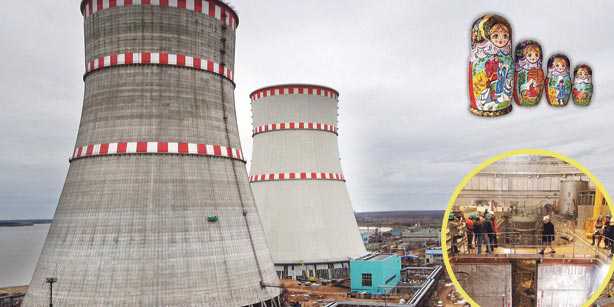As the entire world is now struggling to decide if states’ efforts to develop nuclear energy should continue after what recently happened in Japan’s Fukushima Daiichi nuclear power plant following the March 11 twin earthquake and tsunami disasters, there is also an ongoing public debate in Turkey: People wonder if the Justice and Development Party (AK Party) government is doing the right thing as it seems determined to go ahead with its ambitious nuclear energy program.

According to Rosatom officials, the planned nuclear power plant in Akkuyu and the one in Kalinin are very similar in terms of electricity production technology and safety systems.
Russia’s Rosatom State Nuclear Energy Corporation is concerned with the outcome of the ongoing nuclear energy debate in Turkey because it was awarded a $20 billion deal last year to construct a nuclear power plant in the southern province of Mersin’s Akkuyu district
Russia’s Rosatom State Nuclear Energy Corporation is equally concerned with the outcome of this debate because it was awarded a $20 billion deal last year to construct a nuclear power plant in the southern Turkish province of Mersin’s Akkuyu district. A recent invitation extended to Turkish reporters to visit the Kalinin nuclear power plant that Rosatom officials say utilizes the same technology planned for the Akkuyu power plant is an effort to tame the growing distrust towards nuclear energy in Turkey.
Safest of all
Addressing reporters during that visit, Mihail Kanishev – the chief engineer at Kalinin – said the Akkuyu nuclear power plant will be the safest of its kind, the Cihan news agency reported on Sunday. What he proposed for the planned nuclear power plant in southern Turkey is “a four-layer Matryoshka doll safety system” used in Kalinin. “In case of an accident, heat absorption, natural circulation and cooling automatically start. These safety systems do not require human intervention to start working,” he was quoted as saying by the agency. For him, the Akkuyu nuclear power plant will pose a risk neither to the surrounding inhabitants nor the environment even in case of a magnitude 9 earthquake as happened in northeast Japan last month or even if a plane crashes into the yet-to-be constructed power plant. “The innermost doll is the reactor itself. What constitutes the second doll is the reinforced concrete surface of the reactor. The third doll is the safely cooling system. The water that circulates inside the reactor does not have any contact with the outside world, and neither does the water in the second cooling layer. Only the third cooling circuit uses water supplied externally. In that way, any possible radiation from an accident can only leak from the third layer. The outermost and fourth doll is a safety measure against any possibility of having the reactor badly damaged. Even if the nuclear fuel remains waterless and starts to melt down, the grid we placed at the bottom of the reactor catches this fuel. And because this grid is cooled down with a separate system, we make sure that no blast happens,” he explained.
Rosatom started building the Kalinin nuclear power plant, which is about 200 kilometers northwest of Moscow, in 1974. Its third reactors became operational in 2004, and a fourth reactor is currently under construction. According to Rosatom officials, the planned nuclear power plant in Akkuyu and the one in Kalinin are very similar in terms of electricity production technology and safety systems. The only major difference according to Kanishev, is that Kalinin has 1,000 MW reactors, but the Akkuyu nuclear power plant will have 1,200 MW ones.
Rosatom plans to start construction in Akkuyu in 2013 and have its four planned reactors operational by 2021. Once completed, it is expected to employ 20,000 people. Turkey is presently heavily dependent on foreign energy supplies but aspiring to become self-dependent by 2023, the centennial of the Republic of Turkey. To that end, the AK Party government is planning to have three nuclear plants operational by the 100th anniversary of the republic, while also intensifying oil and natural gas exploration efforts across the country. The growing environmentalist sentiment seems not to have impacted the stance of the government, which says it will never approve any project environmentally hazardous while pursuing the country’s macro interests. According to government officials, people’s environmentalist feelings are used by certain groups who are not happy with the country’s centennial aspirations.
No to Chernobyl, Yes to Akkuyu
As the latest sign of Turkey’s commitment to its nuclear energy program, which the government says is also environment-friendly, Energy and Natural Resources Minister Taner Yıldız said on Monday that he supports protests organized against old-fashioned nuclear power plants that continue producing energy around the world; however, the planned nuclear power plant in Akkuyu should be supported because it poses no risk to the environment at all.
Noting that Greenpeace members often carrying banners reading “No to Chernobyl” during their demonstrations [in Turkey], Yıldız said the same banner should read “No to Chernobyl, Yes to Akkuyu.” “First generation nuclear power plants that are over 40-years old should be closed. But third generation power plants such as the one we plan to build in Akkuyu are necessary. I think Greenpeace will agree,” he said, speaking at a signing ceremony between the state-owned Turkish Pipeline Corporation (BOTAŞ) and the Swiss energy company EGL Group on the transportation and marketing of oil and natural gas.
via Zaman

Leave a Reply